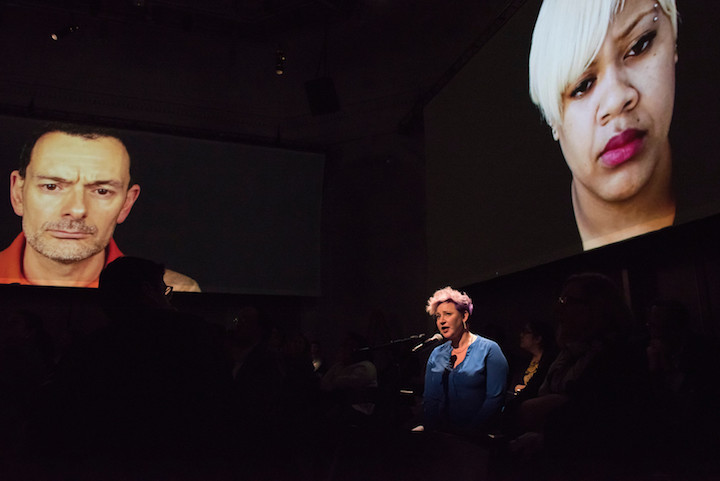
SF Opera Lab opened its second season with The Source. It’s a complex and compelling piece that deals with war and the ways in which the U.S. military obscures what it does in conflict. The Source focuses on Pvt. Chelsea Manning’s release of classified military information in 2010.
The topic in general is of utmost concern. U.S. Special Operations forces are deployed to 135 nations, according to Ken McGraw, a spokesman for Special Operations Command. That the military and the government keep information from the public impacts on our culture vividly. And our ignorance of withheld information wounds other countries and cultures.
For the performance of The Source the Taube Atrium Theater is darkened, and the audience sits in black folding chairs, aligned on the black floor but not touching. The chairs are placed in a rectangle composed of two triangles so that half the audience faces the other half, with an aisle serving as a no-man’s land dividing them. Four singers are seated within the audience, microphones in front of them. They are only visible, really, to the audience immediately surrounding them. Four enormous projection screens form the auditorium’s walls and are elevated above the audience. At any point in the performance three screens inhabit the viewer’s world, the fourth screen at the viewer’s back.
“(1:47:01 PM bradass87: i’m an army intelligence analyst, deployed to eastern baghdad” is projected onto the screens before the piece begins.
The ensemble of seven formidably talented musicians, led from the keyboard by Music Director Nathan Koci, is on a raised platform behind one of the screens and invisible to the audience.
Mark Doten’s intensely poetic libretto collages together scraps of text from Chelsea Manning’s WikiLeaks release, emails to the former hacker Adrian Lamo, who reported her to the authorities, and various texts and musical excerpts found on the internet.
Composer Ted Hearne sets this fragmented and spare text to music that is electrifying, edgy and assaultive, moving between new music classical, rock ’n’ roll and jazz. The music is like Doten’s libretto in that it’s sourced from a wide range of contemporary music genres. But its primary intent is to create an abstract field of sounds that holds the listener in a kind of suspended emotional tension.
The singers’ voices are continuously distorted electronically, which is kind of a pity, not only because these are excellent singers, but also because the text is so on point. Understanding the words is only possible by following the written libretto, the photocopied pages palely illuminated under the projections above.
During the performances different faces are projected onto the screens. As enormous images, the men and women seem to stare blankly into the camera lens. But during the course of The Source it becomes clear that they are watching something. Three or four women among the many impassive faces react to what is in front of them: with horror, fear, dismay.
The audience is given no clues to what these people are seeing or why they are in front of us. At the end of the work, the video they were watching is run. It’s “Collateral Murder”, which was released on WikiLeaks and shows the U.S. military’s uncalled-for killing of a dozen people in a suburb of New Bagdad. Among the killed were two Reuters news staff.
The Source is at times abstract to the point of obscurity, but coding and the obfuscation of information are key to the world that it portrays. And the disfiguring of information and expectation permeates all levels of this piece. It is in the unrelenting use of acronyms, odd substitutions in military designations and computer terms. Look at Doten’s use of clips from the song “Mack the Knife”. Originally from the opening song of Brecht and Weill’s classic The Threepenny Opera, the phrase “Oh, the shark” referred to a paid killer in an imaginary world of crime set in the more sordid parts of Victorian London. The meaning of the song, rife with Brecht’s political cynicism, was reassigned in the 1950s into the upbeat and jazzy by popular singers Louis Armstrong and Bobby Darin. In Doten’s libretto Shark is the military name for a route where an IED (improvised explosive device) was detonated. Doten takes back the song’s original reference, ironically using a clip of Clay Aiken’s winning song on American Idol.
Equally complex in its coding is Manning’s life. Part of the personal battle that the military analyst struggled with was her gender identity, and how gender encoded her life. Her fear is “the possibility of having pictures of me … plastered all over the world press … as a boy.”
Difficult though it may be in its abstractions, The Source handles its topic as art, without making the work either polemical or a form of propaganda. It does that, laudably, by never second-guessing or underestimating the audience. We need to ask ourselves how we have come to watch paranoid U.S. helicopter crews kill civilians in the streets of Bagdad impassively, without recognizable emotion? We need to ask why our country is waging the first truly World War by being deployed in some 70 percent of the countries on the planet. Are we saviors of democracy or pawns of exploitation? Heroes or thugs?
– Jaime Robles
The Source continues at SF Opera Lab’s Diane B. Wilsey Center for Opera on March 1–3, 2017. For tickets and information, visit sfopera.com.
Photo courtesy of SF Opera Lab.
